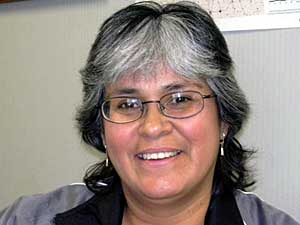Photos
Resources
Your Voice
| |||||||||||||||||||||||||||||||||||||||||||||||||||||
Minnesota's low income kids need new daycare options
February 9, 2004
 |
| Moraima Flores went from paying $50 a month to $236 for a daycare co-pay. (MPR Photo/Bob Reha) |
Moorhead, Minn. — Cuts in state funding have closed two Moorhead daycare facilities, affecting 130 low income children. Moraima Flores is the mother of one of those kids.
Flores works two jobs and her husband is out of work. Now they'll have to find a new day care center for their five-year-old daughter. Flores says the closing comes at a bad time. She and her husband are trying to buy a house. She says their daycare bill will be five times what it was.
 | |||
"I went from paying $50 a month to $236 as far as a co-pay. That adds to the other bills we have," says Flores. "We weren't able to pay our property taxes. Just little things that seem to add up."
What's happened in Moorhead isn't unique. Last spring lawmakers cut $86 million to child care subsidies. Those changes made it harder to qualify for state subsidized child care. Last July, the budget cuts took effect and since then at least 30 licensed child care centers in Minnesota have closed.
The number of people waiting for subsidized day care has nearly doubled. There are more than 14,000 people eligible for daycare assistance, but more than half of them, are on a waiting list.
Moraima Flores says it's frustrating. She says lawmakers don't know what low income people are up against. She says it seems lawmakers don't care about people trying to make their life better.
"They talk about how they want to reform welfare, get people off welfare," says Flores. "To me, it seems like they're just putting the people that are trying to get out of poverty level, back into that level."
Flores says it's an awful situation. It's difficult to find money for simple things, like a toy her daughter wants. She says the pressure of work, and family life is taking a toll.
"Oh, I've been stressed big time. Lately it seems like, (we're) arguing everyday about little things that shouldn't be argued about. It is stressful," says Flores. "What are you suppose to do? I work two jobs, my spouse is looking and then we have a five-and-a-half-year-old."
Minnesota's image as a national leader in things like child care has been undermined. A recent study sponsored by the Children's Defense Fund Minnesota and Child Care WORKS is an example. Before the state cuts, Minnesota ranked fourth among states in terms of how much money a family could make and still be eligible for assistance. Now it ranks 29th.
The Pawlenty administration has defended the cutbacks, saying the state simply doesn't have the money and must live within it's revenues.
Joe Pederson is executive director of the the Lakes and Prairie Community Action Partnership. The non-profit group helps low-income people with everything from day care to assistance with heating bills. Pederson says cuts in state funding made it impossible to operate the daycare centers.
Pederson worries more cuts may be coming. He says Minnesota is losing some of the compassion it once had for it's less fortunate residents. It's a change in attitude he doesn't like.
"We're more concerned about a tax cut for me then help for you. We're more concerned about a lower license plate fee for me than help for you," says Pederson. "And I think it's our job to get the message out that it could be you next."
Pederson says if some funding isn't restored for day care programs, it will make it impossible for low-income people to break out of poverty.
Or maybe they'll just move. All of Minnesota's neighboring states, except Iowa, make it easier to qualify for day care assistance.
|
News Headlines
|
Related Subjects
|

